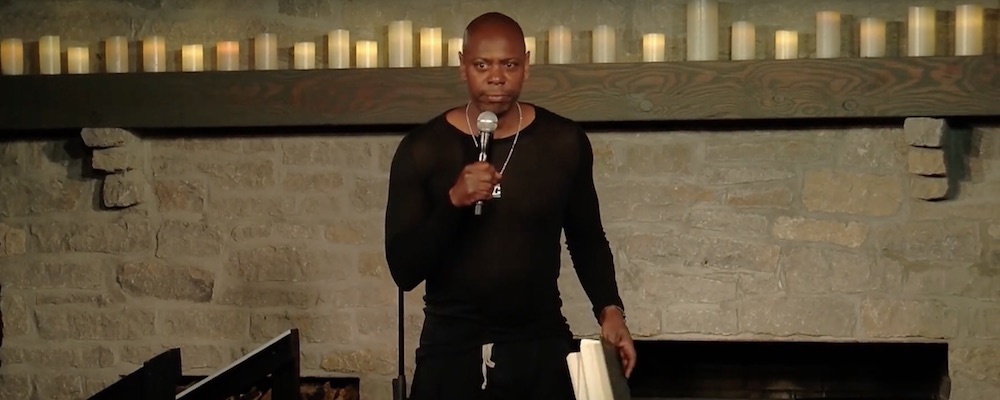Dave Chappelle Issues a Powerful Call to the People in Sobering Netflix Special
Alci Rengifo
“8:46,” the surprise comedy special released by Dave Chappelle is only 27 minutes and 20 seconds long. Yet these 27 minutes constitute the first important response by a popular artist on the unrest that has swept the streets of America and other corners of the globe for weeks now. Released exclusively on Netflix’s YouTube comedy channel, Chappelle’s performance cannot be labeled as mere “comedy.” It has funny moments, as one would expect, but it is instead a razor sharp commentary on the entire context of why George Floyd’s death under the knee of a Minneapolis police officer has not only sparked protests, but another round of the U.S. needing to reckon to with its own past.
The special was filmed on June 6 at Yellow Springs, Ohio. With audience members needing to follow social distancing regulations, including wearing masks (with a trademark “C”), Chappelle takes the stage and forgoes his usual intros and theatrics. He gets straight to the point. 8:46 is the amount of time officer Derek Chauvin kept his knee on Floyd’s neck, producing the deadly suffocation that would kill the black American while other cops watched. Chappelle does little to hide his righteous anger at not only the incident itself, but the long history surrounding it and countless other similar killings by police of black Americans. For Chappelle the impact of Floyd’s death even struck a particularly personal note in its finer details. 8:46 is also the comedian’s time of birth. He shares his annoyance at commentators wondering how many black celebrities will speak out on Floyd and the subsequent Black Lives Matter protest (although Chappelle never mentions the movement by name). “Do we give a fuck what Ja Rule thinks? Does it matter about celebrity? No. This is the streets talking for themselves. They don’t need me right now,” says Chappelle.
“8:46” in essence marks a powerful return for Chappelle to the very essence behind his usual brand of comedy. He has been called obscene, mean and vulgar, but no one can call the man an idiot. He is a provocateur in every sense of the word, and in this short special what he demands of his audience is that they think. He has no illusions of who the enemies of the people are at this moment, in particular signaling out conservative commentator Candace Owens for her attempts to divert attention to Floyd’s shortcomings. He has also amassed verbal ammunition for Laura Ingraham, who he mocks for having the imbecilic audacity to tell LeBron James to “shut up and dribble.” When Chappelle makes fun of Owens’s “stinky pussy” or calls Ingraham “a cunt,” he comes across more as a citizen sick and tired of the situation as opposed to a mere shock comic. Chappelle repeatedly returns to the idea of how long eight minutes is, how Floyd called out for his dead mother as his own life came to a tragic end, and he recalls how his own father did the same in his deathbed. For Chappelle it is simply irrational that a sane person could ponder all this and not feel the kind of rage now manifesting itself in the streets.
Much of “8:46” also consists of striking historical parallels Chappelle draws between the Floyd case and other recent incidents. He narrates the story of Chris Dorner, an LAPD officer who was fired after reporting wrongdoing by his white partner in the field. Dorner went on to carry self-described “asymmetrical warfare” against the LAPD by assassinating officers before a manhunt resulted in Dorner’s death in 2013 in the San Bernardino Mountains. Chappelle rightfully reflects on how 400 officers were sent to kill Dorner, since the victims had been fellow officers, yet no one stepped in to save George Floyd. “How the fuck can’t they understand what’s going on in these streets? We saw ourselves how you see yourself.” At times Chappelle’s humor while going through recent history is not meant to provoke laughter, but wise irony. When discussing Trayvon Martin killer George Zimmerman he clarifies that he hates the idea of Zimmerman, not the man himself, but if he met him he would probably end up hating him too. To emphasize just how common police brutality against black Americans is, Chappelle also tells the story of a young father, John Crawford, shot by police while buying groceries right in the same town where the special is being filmed. Crawford’s story was “lost in the sauce,” as Chappelle puts it, because it was the same week as Michael Brown’s death at the hands of Ferguson police.
Chappelle tends to get little credit for how he can flow from humor into powerful, lasting anecdotes. In his 2018 Netflix special “Equanimity and the Bird Revelation,” the comic gave his own unforgettable narration of the Emmett Till lynching. Here he ends on a more positive but potent story about how his great grandfather, William David Chappelle, led a black American delegation to meet with President Woodrow Wilson to discuss racist violence. William David had been born a slave. Why does Chappelle mention this? Because it reminds us how the history of slavery in this country, and the roots of the inequality at the center of our current predicament is not so distant. This is not ancient history by any means, but close enough that no right-wing pundit can easily brush it off.
“8:46” is more than just Dave Chappelle doing his standard routine. It is a fiery use of the comedian’s mic to comment on the world, on America and how history is a part of our lives whether we like it or not. Chappelle’s job is not just to make us laugh here, but to look around and understand. The provocateur is seeking to provoke us into waking up.
“8:46” premiered June 11 on Netflix Is a Joke on YouTube.

